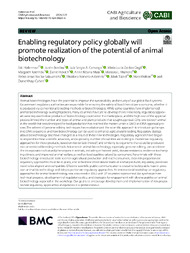Enabling regulatory policy globally will promote realization of the potential of animal biotechnology.
Enabling regulatory policy globally will promote realization of the potential of animal biotechnology.
Author(s): HALLERMAN, E.; BREDLAU, J.; CAMARGO, L. S. de A.; DAGLI, M. L. Z.; KAREMBU, M.; KOVICH, D.; MUIA, A. N.; MURRONE, M. L.; ROCHA?SALAVARRIETA, P. J.; ROMERO?ALDEMITA, R.; TIZARD, M.; WALTON, M.; WRAY?CAHEN, D.
Summary: Animal biotechnologies have the potential to improve the sustainability and security of our global food systems. Government regulatory authorities are responsible for ensuring the safety of food their citizens consume, whether it is produced via conventional breeding methods or biotechnologies. While some countries have implemented animal biotechnology oversight policies, many countries have yet to develop theirs. Historically, regulatory approvals were required before products of biotechnology could enter the marketplace, and the high cost of the approval process limited the number and types of animal and plant products that sought approval. Only one biotech animal in the world that was developed for food production has reached the market under a GMO or rDNA approval process. The advent of genome editing techniques has revolutionized the scientific approach to introducing changes into DNA sequences and how biotechnology can be used to enhance agricultural breeding. Regulatory dialogs about biotechnology also have changed as a result of these new technologies. Regulatory agencies have begun to respond to these scientific advances, and a growing number of countries are looking to modernize regulatory approaches for these products, based on risk (or lack thereof) and similarity to organisms that could be produced via conventional breeding methods. Advances in animal biotechnology, especially genome editing, can accelerate the incorporation of valued phenotypes in animals, including enhanced yield, disease resistance, resilience to changing climate, and improved animal welfare, as well as food qualities valued by consumers. For animals with these biotechnology-introduced traits to enter agricultural production and reach consumers, clear risk-proportionate regulatory approaches must be in place, and to facilitate international trade of animal products, regulatory processes need to be aligned and compatible. Effective scientific public communication is crucial to build public trust in precision animal biotechnology and risk-proportionate regulatory approaches. An international workshop on regulatory approaches for animal biotechnology was convened in 2022 with 27 countries represented. We synthesize here technical progress, development of regulatory policy, and strategies for engagement with diverse publics on animal biotechnology reported in the workshop. Our goal is to encourage development and implementation of risk-proportionate regulatory approaches and policies in a global context.
Publication year: 2024
Types of publication: Journal article
Unit: Embrapa Dairy Cattle
Observation
Some of Embrapa's publications are published as ePub files. To read them, use or download one of the following free software options to your computer or mobile device. Android: Google Play Books; IOS: iBooks; Windows and Linux: Calibre.
Access other publications
Access the Agricultural Research Database (BDPA) to consult Embrapa's full library collection and records.
Visit Embrapa Bookstore to purchase books and other publications sold by Embrapa.

